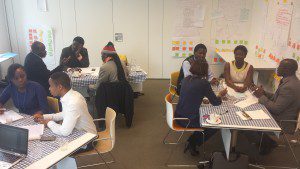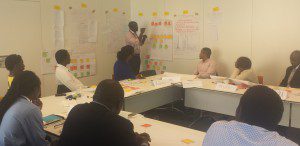From 13 – 17 April, The Hague Academy conducted the first diaspora-oriented Lobby & Advocacy training of the Diaspora Academy. This Academy has been launched in May 2014 by the African Diaspora Policy Centre (ADPC) in cooperation with The Hague Academy of Local Governance and The Network University (TNU). The overall objective of the Academy is to upgrade and strengthen the professional skills and competences of diaspora organisations in Europe engaged in improving social and economic conditions and communal harmony in their countries of origin.
The ten African diaspora participants, who took part in this first training represented leading diaspora organisations from Finland, Norway, The Netherlands, the UK and the USA. They originated from Ghana, Tanzania, Ethiopia, Zambia, Uganda, Sierra Leone and South Sudan.
During the training course, the participants learned about the difference between lobby and advocacy and to understand power and public policy processes. They worked intensively on the design of an advocacy strategy; a.o. identifying their advocacy issues, making a problem tree, carrying out stakeholder analyses; and practised with different advocacy tools. As one of the participants said “The main strength of the programme is the mix of practical exercise and the theory. Also, there was room for discussions and sharing experience with challenges and opportunities for diaspora advocacy”. The contribution to the programme of Babah Tarawally, journalist and novel writer, who shared his expertise was of high value for the programme and much appreciated by the participants.
The participants appreciated the practice oriented training, sharing that “the methods and tools are relevant for my engagement with policy makers working on investment related issues for both the government of my country of origin and my host country”, and “in the future I will definitely apply the knowledge that I have gained from the training. I will use the knowledge and skills as advocacy tools in influencing policies. The policy circle has taught me where, how and when to influence policy development.”
We look forward to welcome a new diaspora group for this training in October 2015.


